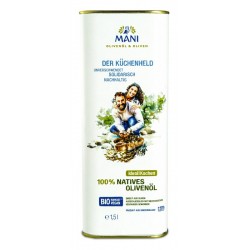Refined olive oil is on everyone's lips … But not necessarily because it tastes so good! Rather, it is hotly suspected of not being healthy enough for daily use. Does this accusation actually exist or is it more of a rumour? Can refined olive oil be used for roasting and deep-frying, or should you rather keep your hands off it? The following text clears up prejudices and reveals the advantages and disadvantages of refined olive oil brings to the table.
What is refined olive oil?
What are refined vegetable oils and what are they good for? Refined olive oil, like virgin and extra virgin olive oil – both cold-pressed - comes from olives. But unlike cold-pressed oils, it is produced chemically rather than mechanically.
Refined olive oil can be recognized on the supermarket shelf by the fact that it is labeled simply “olive oil”. It is missing the “extra virgin” or “virgin”..
Difference between extra virgin olive oil and refined olive oil
The difference between cold-pressed and refined olive oil is quickly explained: cold-pressed olive oil, as the name suggests, is extracted through a mechanical pressing process. Due to the gentle production, the nutrients are reliably preserved.
Refined olive oil, on the other hand, is made using chemicals. Among other things, solvents such as hexane or light petroleum are used. The unhealthy additions are removed again during refining, but to do this the oil has to be heated to over 200°C - over a period of several hours. Refining removes the inedible chemicals from the oil, but at the same time robs it of its enjoyment potential: When heated to high temperatures, olive oil loses its exquisite taste and many of its natural ingredients. All of the precious fat by-products that make native olive oils so healthy are either greatly reduced or non-existent in refined oils.
Advantages
Both cold-pressed and refined olive oils bring their personal advantages and strengths to the kitchen battle. But who wins in a direct comparison?
Benefits of extra virgin olive oils:
- Smell and taste: Virgin olive oils taste good fruity and aromatically round off salads as well as warm dishes!
- Health: Thanks to its high proportion of Unsaturated fatty acids and vitamins, cold-pressed olive oil gives dishes an all-round health boost. Virgin olive oil contains valuable fat by-products such as tocopherols, carotenoids and phytosterols. In addition, it has secondary plant substances such as phenolic compounds, which even have a positive effect on the metabolism.
- Heat resistant: Unlike many others Vegetable oils, virgin olive oil can be heated up to 180 °C without hesitation.
- Fryable: Thanks to the monounsaturated fatty acids cold-pressed olive oil is all the more heat-resistant. In addition, unlike most vegetable oils, it frys at low temperatures - from as little as 150 -. 160°C!
- Sustainable production: The gentle production not only protects the ingredients, but also the planet.

Olive harvest and oil press in Greece
Benefits of Refined Olive Oils:
- Reasonable price: Refined olive oil can easily are produced in large quantities and can therefore be bought cheaply in stores!
- Neutral taste: One (taste- )Loss is another's gain? The mild taste of its own takes second place to most foods.
- High heat resistance: Refined olive oil can be up to heated to 230 °C and therefore used for searing!
- Long durability: Through treatment with Refined oils have a long shelf life when exposed to chemicals and strong heat.
Disadvantages
Of course, both olive oils also have their individual disadvantages. But do they actually take the same minus on the respective bottle cap or is there a clear answer to the question: What is better: cold-pressed or refined?
Disadvantages of cold-pressed olive oils:
- Higher price: If you prefer quality to quantity, you pay for it … But fortunately not excessively! A certain surcharge has to be accepted for high-quality virgin and extra virgin olive oil. However, especially if you choose “normal” virgin oil, it doesn't weigh too much on the wallet.
Disadvantages of refined olive oils:
- Little taste: Just leaves in the salad Refined olive oil miss pep …
- Unsafe: Dissolves during refining not only the healthy ingredients in heat, it can also cause additional health-threatening trans-fatty acids.
- Environment: The refining process uses a lot of energy and is based on chemical-assisted extraction.

MANI olive oils convince with virgin (extra) quality
Conclusion
Refined oils have their uses, but the bottom line is that cold-pressed olive oil wins in front. While refined olive oil is not necessarily unhealthy, it is not the first choice in most kitchen matters either. The benefits of cold-pressed oils outweigh in many ways. The high proportion of unsaturated fatty acids and vitamins provides a healthy basis for argumentation and the exquisite taste does the rest. A nutritious pleasure: both in the cold and in the warm kitchen.
For this reason, none of the MANI olive oils are refined, because MANI stands for raw food quality in every kitchen location!
Get exclusive insights and uncover the secrets of olive oil with our newsletter! Don’t miss out on the latest findings, special content, and motivating stories we compile around the topic of refined olive oil and its health benefits. Our carefully selected blog posts, including in-depth analyses and fascinating articles like this one, await you directly in your inbox. By signing up, you gain access to exclusive tips, culinary inspirations, and all the knowledge about this liquid gold. Register now and become part of our community exploring the diverse world of olive oil.


















